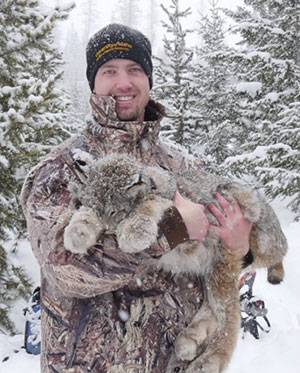
Contact Us
Institutional Communications
Bureau of Mines Building, Room 137
Laramie, WY 82071
Phone: (307) 766-2929
Email: cbaldwin@uwyo.edu
UW Appoints Inaugural Professor for Jackson Fork Ranch-UW Research Project
Published April 17, 2023

Joe Holbrook, here holding a Canada lynx captured as part of his research, has
been named the first Wyoming Biodiversity Term Professor for the Jackson Fork Ranch-University
of Wyoming Research Project. (UW Photo)
Joe Holbrook, University of Wyoming assistant professor in carnivore and habitat ecology, has been named the first Wyoming Biodiversity Term Professor for the Jackson Fork Ranch-University of Wyoming Research Project. The position promotes environmental stewardship and conservation across Wyoming, with an initial focus on the greater Yellowstone ecosystem.
“I am honored to be named the first Wyoming Biodiversity Term Professor,” Holbrook says. “Serving the cause of wildlife conservation while mentoring the next generation of applied scientists is where my passion lies. This collaboration will provide vast opportunity to expand conservation impact as well as influence the lives of numerous students.”
The Wyoming Biodiversity Term Professor for the Jackson Fork Ranch-University of Wyoming Research Project aims to increase understanding of biodiversity throughout Wyoming by engaging outstanding UW researchers; training the next generation of wildlife conservation biologists; and sharing the research results with the world. It also grows sustainable conservation tourism in the region.
The professorship is funded by the Jackson Fork Ranch-University of Wyoming Research Project, made possible by a gift from Joe Ricketts’ Jackson Fork Ranch.
Holbrook is an interdisciplinary quantitative wildlife ecologist in UW’s Haub School of Environment and Natural Resources and the Department of Zoology and Physiology. He studies the intersection of population and community ecology, which informs conservation. In general, he studies why animals locate where they do and how environmental change influences them.
Holbrook earned a Ph.D. in natural resources from the University of Idaho, as well as a master’s degree in range and wildlife management from Texas A&M University and a bachelor’s degree in wildlife ecology from the University of Idaho. Before coming to UW, Holbrook worked at Montana State University and the U.S. Forest Service Rocky Mountain Research Station as a research scientist.
Holbrook’s publications include work on the impact of wildfire and forest management on the snowshoe hare and Canada lynx; predicting coyote habitat in times of prey scarcity; and how interconnected habitat affects endangered ocelots.
Holbrook’s focus for this professorship will be small- and medium-sized mesocarnivores, which form an important but poorly known component of the state’s fauna. Holbrook’s body of work falls within this area and focuses on the American badger, ocelot, swift fox, jaguarundi, coyote, Canada lynx, red fox, wolverine, Pacific marten, bobcat, black bear and mountain lion.
The wide range of biodiversity in Wyoming is not well studied, especially lesser-known species that have a disproportionately large impact on ecosystem function and biodiversity.
“Dr. Holbrook is a consummate professional committed to wildlife conservation and management,” says John Koprowski, dean of the UW Haub School of Environment and Natural Resources. “He is the ideal recipient of the Wyoming Biodiversity Term Professorship and has a passion for conservation research, student mentorship and sharing the stories that result -- the keys to this exciting collaboration.”
The Wyoming Biodiversity Term Professor position was established through an endowment created by Ricketts and the Jackson Fork Ranch. Ricketts is an entrepreneur and philanthropist who lives in western Sublette County. He founded the online brokerage firm TD Ameritrade.
The position is part of the Jackson Fork Ranch-University of Wyoming Research Project, which supports the university’s conservation and biodiversity research throughout Wyoming. It will help increase public awareness of the unique value of biodiversity in the state and will promote the importance of environmental stewardship as an enduring value.
UW’s Haub School of Environment and Natural Resources advances the understanding and resolution of complex environmental and natural resource challenges, with a diverse faculty undertaking novel approaches to environmental and natural resource questions in a range of fields.
The Haub School’s programs for undergraduate and graduate students emphasize critical thinking, collaborative problem-solving and interdisciplinary approaches in environmental systems science, sustainability, outdoor leadership, environmental law and more.
Contact Us
Institutional Communications
Bureau of Mines Building, Room 137
Laramie, WY 82071
Phone: (307) 766-2929
Email: cbaldwin@uwyo.edu
